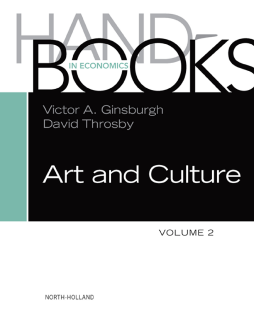
Additional Information
Book Details
Abstract
This volume emphasizes the economic aspects of art and culture, a relatively new field that poses inherent problems for economics, with its quantitative concepts and tools. Building bridges across disciplines such as management, art history, art philosophy, sociology, and law, editors Victor Ginsburgh and David Throsby assemble chapters that yield new perspectives on the supply and demand for artistic services, the contribution of the arts sector to the economy, and the roles that public policies play. With its focus on culture rather than the arts, Ginsburgh and Throsby bring new clarity and definition to this rapidly growing area.
- Presents coherent summaries of major research in art and culture, a field that is inherently difficult to characterize with finance tools and concepts
- Offers a rigorous description that avoids common problems associated with art and culture scholarship
- Makes details about the economics of art and culture accessible to scholars in fields outside economics
"This handbook is situated at the very cutting edge of modern economics: the place where rational thought and the idea of culture meet, mix and invite to new exciting theories. Add to this a deep concern with culture in the form of art, and you have a book that becomes extra interesting and important – to general readers, social scientists and good libraries." --Richard Swedberg, Cornell University
"This book is an actual encyclopedia of creativity in a disguise of collected papers. It is enjoyable like a product of creative art, valuable as a stimulus of mind and useful mentor in the process of our problem solving. It is worth reading."--Istvan Magyari-Beck, Corvinus University of Budapest and New York State University College at Buffalo, New York
"Victor Ginsburgh and David Throsby have prepared an edited volume that will quickly become the standard resource in the field of cultural economics. This carefully constructed work provides both the breadth of subjects and detailed analysis necessary for teachers, researchers, practitioners, and students, with topics ranging from creative genius to the pricing of rock concerts." --Kathryn Graddy, Brandeis University
